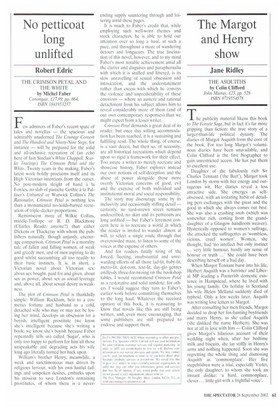No petticoat long unlifted
Robert Edric
THE CRIMSON PETAL AND THE WHITE by Michel Faber Canongate, 117.99, pp. 864, ISBN 1841953237 Few admirers of Faber's recent spate of tales and novellas — the spacious and admirably unadorned The Courage Consort and The Hundred and Ninety-Nine Steps, for instance — will be prepared for the solid and all-inclusive recreation of (an echo here of lain Sinclair's White Chappell, Scarlet Tracings) The Crimson Petal and the White, Twenty years in the making, Faber's latest work boldly proclaims itself and its High Victorian intentions from the outset. No post-modern sleight of hand a la Fowles, no slab of pastiche Gothic A la Palliser's Unburied or Warwick Collins's The Rationalist, Crimson Petal is nothing less than a monumental no-holds-barred recreation of triple-decker proportions.
Reminiscent more of Wilkie Collins, middle-Trollope or R. D. Blackmore (Charles Reade, anyone?) than either Dickens or Thackeray with whom the publishers naturally, though unjustly, encourage comparison. Crimson Petal is a morality tale of fallen and falling women, of weak and greedy men, and of men aspiring to do good whilst succumbing all too readily to their basic instincts. It is, in short, a Victorian novel about Victorian sex: about sex bought, paid for and given, about sex as power, about sex as social leverage and, above all, about sexual desire as weakness.
The plot of Crimson Petal is thankfully simple: William Rackham, heir to a cosmetics fortune and husband to a cold, detached wife who may or may not be losing her mind, develops an obsession for a boyish, intelligent prostitute (we know she's intelligent because she's writing a hook; we know she's boyish because Faber repeatedly tells us) called 'Sugar', who is only too happy to perform for him all those unspeakable and degrading acts his wife long ago literally turned her back upon.
William's brother Henry, meanwhile, a weak and sanctimonious man driven by religious fervour, with his own lustful failings and unspoken desires, embarks upon his mission to save London's remaining prostitutes, of whom there is a never
ending supply sauntering through and loitering amid these pages.
It is much to Faber's credit that, while employing such well-worn themes and stock characters, he is able to hold our attention over so long a haul, at such a pace, and throughout a maze of wandering detours and longueurs. The true fascination of this novel, however, and to my mind Faber's most notable achievement amid all the clutter and disguises and paraphernalia with which it is stuffed and littered, is its slow unravelling of sexual obsession and intoxication, and the understatement rather than excess with which he conveys the violence and unpredictability of these emotions — where an austere and rational detachment from his subject allows him to reveal considerably more of them (and of our own contemporary responses) than we might expect from a lesser writer.
Crimson Petal demands a great deal of its reader. but Once this willing accommodation has been reached, it is a sustaining and fulfilling read. The whole thing, of course, is a vain deceit, but then so, of necessity, are all historical recreations which depend upon so rigid a framework for their effect. Too astute a writer to merely recreate and showcase history, Faber explores instead our own notions of self-deception and the abuse of power alongside those more overtly Victorian concerns of good, evil and the exercise of both individual and institutional moral and social responsibility.
The story may discourage some by its inclusivity and occasionally stifling detail — certainly, no turd-strewn street remains undescribed, no skirt and its petticoats are long unlifted — but Faber's foremost concern here is to recreate a world in which the reader is invited to wander almost at will, to select a single route through that overcrowded maze, to listen to some of the voices at the expense of others.
And for readers finally tiring of the forced, fleeting, insubstantial and unrewarding efforts of all those lad-lit, baby-lit, metro-lit, dot-com, text-lit, day-glo genres endlessly three-for-twoing on the bookshop tables, I would recommend Crimson Petal as a restorative and solid antidote; for others I would suggest they turn to Faber's earlier work before committing themselves to the long haul. Whatever the received opinion of this book, it is reassuring to know that novels like this are still being written, and, even more encouraging, that some publishers are still prepared to endorse and support them.


































































































 Previous page
Previous page